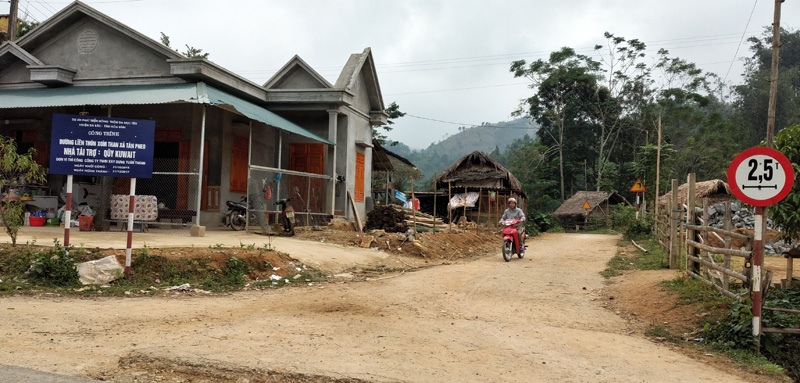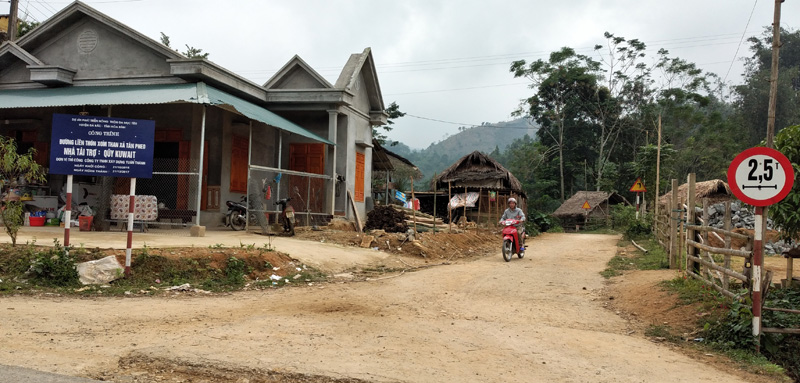
(HBO) – Da Bac is a mountainous district with intertwined hills, mountains, rivers and streams, leading to many narrow strips and steep topography. This variable terrain causes difficulties for not only transport but also natural resources exploitation and economic development.
 The inter-hamlet road in Tan Pheo commune has met local
transport, trading and socio-economic development demand.
The inter-hamlet road in Tan Pheo commune has met local
transport, trading and socio-economic development demand.
Forests are the most valuable asset of Da Bac,
which is home to the largest natural area compared to that of other districts
in Hoa Binh province, and most of the area is forest land – 65.12 percent or
more than 50,660ha. Forests are "green lungs”, and they also provide humans
with precious produce nurtured by their own diverse resources.
Developing forest-based economic activities has
been and will remain a suitable development direction for the district. From
now to 2050, Da Bac plans to turn forest-based activities into a spearhead
economic sector and continue consolidating the four local socio-economic
pillars of forest-based economic activities, livestock and crop production by
farming households, herbal plant development, and tourism.
As a district with the highest household poverty
rate in Hoa Binh – 51.75 percent in 2015, Da Bac faces numerous challenges to
the realisation of the resolution of the provincial Party Congress for the
2015-2020 tenure. Amid limited resources, the district’s Party organisation and
administration consider developing road transport infrastructure as the top
priority.
So far, all communes in Da Bac have had roads
helping their centres accessible by car. Up to 98 percent of the
district-managed roads, 97 percent of inter-commune roads, 70 percent of
inter-hamlet roads, and 72 percent of roads in local villages have been paved.
More roads crossing fields have been built or renovated, over 1,260km of the
roads managed by district and communal authorities have received regular
maintenance, and Provincial Road 433 has continued to be upgraded.
Aside from the resolve to invest in
infrastructure to boost socio-economic development, Da Bac district has also
paid attention to improving people’s awareness. Realising the necessity to
escape from poverty on their own, local residents are determined to overcome
hardships and not to rely on external support.
From 2015 to 2019, the household poverty rate
here decreased by 4.9 percent annually on average to 32 percent at the end of
last year. Compared to 2015, per capita income surged 160 percent to 27.5 million
VND (nearly 1,200 USD) in late 2019./.
The emulation movement "Hoa Binh joining hands to build new-style rural areas” has been widely spreading, becoming a driving force that motivates the localities to renew rural landscapes and improve the material and spiritual lives of the residents. In this movement, the people play a central role-both as the main implementers and direct beneficiaries of its outcomes.
In response to the global digital revolution, Hoa Binh Newspaper is transforming itself into a modern and multi-platform media hub, blending cutting-edge technology with a restructured newsroom and a new generation of tech-savvy journalists.
Hoa Binh province’s Association of the Elderly recently held a conference to review the project on expanding the inter-generation self-help club model until 2025.
In a move to implement Resolution No. 57-NQ/TW, issued on December 22, 2024 by the Politburo, which targets breakthroughs in science-technology development, innovation, and digital transformation, the Hoa Binh provincial Department of Health has issued a plan to roll out the "Digital Literacy for All” campaign within the local health sector.
An Nghia Commune (Lạc Sơn District) is one of the communes that achieved the tha standard of the national new rural area in 2018. Entering a new development phase, the commune is now trying to meet the criteria for the advanced new rural development. With the strong political will and the public consensus, the commune is gradually overcoming the challenges to reach this goal, aiming for the sustainable development.



 The inter-hamlet road in Tan Pheo commune has met local
transport, trading and socio-economic development demand.
The inter-hamlet road in Tan Pheo commune has met local
transport, trading and socio-economic development demand.